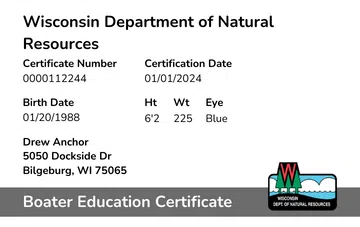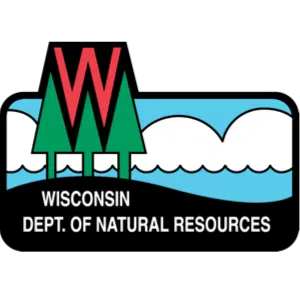
Wisconsin Boating License Guide
Discover all you need to know about obtaining your Wisconsin boating license, including age & operator requirements, vessel guidelines, and Wisconsin boating license regulations.
Key Takeaways
- You need a boating license if you were born on or after Jan 1, 1989 and will be operating a motorized vessel.
- To get a boating license, take a Wisconsin-approved boater safety course.
- Carry your boating license on board your vessel.
- The Wisconsin Department of Natural Resources administers the boater safety program.
How to get an Wisconsin Boating License
- Check to see if you need boater education and can legally operate a boat.
- Take a Wisconsin-approved boater safety course.
- Pass a final examination.
- Carry your certification onboard your boat.
Who Needs a Boating License in Wisconsin?
In Wisconsin, anyone born on or after January 1, 1989, is required to complete a boater safety course to legally operate a motorized vessel on the state’s waters. This applies to operators of motorized boats and personal watercraft.
Even if you aren’t legally required to hold a boating license, the Wisconsin Department of Natural Resources stresses the value of boating safety education and encourages everyone to complete formal boating safety training.
Exceptions to the boat license requirement
- Individuals operating non-motorized vessels: People using canoes, kayaks, paddleboards, and other non-motorized watercraft are not required to complete the boater safety course.
Operators with a valid boating safety certificate from another state: If you have completed an approved boater safety course in another state and possess a valid certificate, you may not need to retake the course in Wisconsin.
Commercial operators: Individuals operating a motorized vessel for commercial purposes may be exempt if they meet specific professional licensing or certification requirements.
Individuals under direct supervision: Persons operating a motorized vessel under the direct supervision of a qualified adult (who meets the boater safety requirements) may be exempt from having their own certificate.
For the most accurate and detailed information, it’s always best to check the latest regulations on the Wisconsin Department of Natural Resources (DNR) website.
Who can operate a boat in Wisconsin?
In Wisconsin, the following rules apply to who can operate a boat:
Children under 10 years of age:
- May not operate a motorboat.
Children aged 10-11 years:
- May operate a motorboat only if accompanied by a parent, guardian, or designated person over 18 years of age.
Individuals aged 12-15 years:
- May operate a motorboat only if:
- They have completed a DNR-approved boating safety course and carry a safety certificate, or
- They are accompanied by a parent, guardian, or designated person over 18 years of age.
- May operate a motorboat only if:
Individuals aged 16 years and older:
- May operate a motorboat if they have completed a DNR-approved boating safety course and carry a safety certificate.
Personal Watercraft (PWC) Operation:
- Individuals under 12 years old may not operate a PWC.
- Individuals aged 12-15 years may operate a PWC only if they have completed a DNR-approved boating safety course and carry a safety certificate, or if accompanied by a parent, guardian, or designated person over 18 years of age.
- Individuals aged 16 years and older may operate a PWC if they have completed a DNR-approved boating safety course and carry a safety certificate.
Take a Wisconsin-Approved Boater Safety Course
In Wisconsin, you can take NASBLA-approved boater safety courses to ensure you meet state and national boating safety standards. These courses are available online and in-person, offering flexibility to fit your schedule. They typically take about 3-8 hours to complete, depending on the format and provider. Online courses are convenient and self-paced, while in-person classes provide direct interaction with instructors. Upon successful completion, you’ll receive a boater education card.
Online Courses Approved in Wisconsin
Web-based boating safety courses are available through several state-approved providers. Online course options charge a one-time fee, generally ranging from $20 to $40.
- www.BoaterExam.com ($39.95)
- www.Boat-Ed.com ($44.95)
- iLearntoboat.com ($54.95)
Coming Soon 🤞
We are working to get a Recademics Boater Safety Course approved in Wisconsin.
In-person courses
The state offers live, in-person and instructor-led courses for free. These courses are volunteer lead and scheduled throughout the year.
In-person courses are a minimum of 8-hours of face-to-face instruction and skill demonstration in areas like boating safety, equipment and requirements, navigation, motorboat, registration, titling, emergency measures, and related Wisconsin boating laws and regulations.
At the end of the instructional segment, participants must pass a written test in order for the course to be considered complete.
Alternative in-person courses include options provided by the:
Pass the Final Boating Exam
At the end of your boater safety course, you will need to take and pass the boater safety test. By passing this test, you prove that you have at least the minimum knowledge regarding required equipment, safety contingencies, navigation, and how to respond in a variety of emergencies to keep yourself, your passengers, and other watergoers safe.
Generally, a score of 80% is considered passing. Many course providers will offer unlimited attempts, so if test-taking is something that makes you nervous, make sure you find a course vendor that provides this. Alternatively, you may use study guides and boater safety test preparation tools for your state to improve your chances of passing on one of your attempts.
Get Your Boating License!
Once you’ve finished the online course and passed the exam, you’ll want to keep the certificate or card you received in a safe place and carry it with you anytime you’re out on the water.
If you completed an online NASBLA-approved course, you will likely have the option to download and print a temporary Wisconsin Boater Safety Certificate. You can then expect your official Wisconsin Boater Safety Certificate, aka boating license, to arrive in the mail anywhere from a few days to a few weeks.
Why You Need a Boating License in Wisconsin
Legal Compliance
Depending on your age, you must have a boater education certificate in order to operate a boat on Wisconsin waterways. Certified boaters keep Wisconsin waterways safe. When you complete the requirements for earning a boating license in Wisconsin, you also demonstrate you’ve mastered the knowledge and operational skills to ensure that you safely operate a vessel safely.
Boater Education reduces accidents and fatalities
Boater education is essential for enhancing safety on Wisconsin’s waterways, significantly reducing accidents and fatalities. Wisconsin’s boating safety courses provide vital knowledge on navigation rules, emergency procedures, and the proper use of safety equipment. By understanding these critical aspects, boaters can avoid collisions, respond effectively to emergencies, and make informed decisions based on weather and environmental conditions. Educated boaters contribute to a safer and more enjoyable experience for everyone on Wisconsin’s diverse waters, from the Great Lakes to its numerous rivers and lakes.
Wisconsin Boating License FAQs
Do I need to renew my Wisconsin Boating License?
No, you do not need to renew the Wisconsin boating license. It is good for life!
Is the Wisconsin Boating License good in other states?
Yes! The Wisconsin Boating License is recognized in all 50 states and Canada. This is known as reciprocity.
How do I replace a lost or stolen Wisconsin boating license?
If you lose your boating license or it is stolen, contact the course provider who issued your license. As a fallback, you can contact the Wisconsin Department of Natural Resources to obtain a new one. There may be replacement and processing fees.
How old do you have to be to get a Wisconsin boating license?
In Wisconsin, there is no minimum age requirement to take a boating safety course and obtain a boating safety education certificate.
How long is the Wisconsin boating license valid for?
The Wisconsin boating license is good for life and does not need to be renewed. However, it’s a good idea to take a refresher course once in a while because laws change!
How much is a boating license in Wisconsin?
The cost to obtain a boating license online in Maryland ranges from $35 to $60.
What happens if I'm caught boating without my license in Wisconsin?
If you are caught boating without a required boating safety certificate in Wisconsin, you may face several consequences, including:
- Fines: You could be fined for operating a boat without the necessary certification. The exact amount can vary but typically falls within the range of monetary penalties set by Wisconsin law for such infractions.
- Misdemeanor Charges: Operating a motorized vessel without a boating safety certificate can result in misdemeanor charges, depending on the circumstances and whether it is a repeat offense.
- Boat Impoundment: In some cases, law enforcement officers may have the authority to impound your vessel if you are found operating it without the required certification.
- Court Appearance: You may be required to appear in court to answer to the charges, which could involve additional legal fees and penalties.
- Mandatory Boating Safety Course: If you are found in violation, the court may require you to complete a boating safety course as part of your penalty.
For the most accurate and current information, it is always best to refer to the Wisconsin Department of Natural Resources (DNR) or consult legal counsel.
Sources & Citations
- Wisconsin Department of Natural Resources. “Boating Safety and Regulations.” Accessed June 18, 2024. https://dnr.wisconsin.gov/Education/OutdoorSkills/Boat.
- Wisconsin Department of Natural Resources. “Consequences of Boating Without a License.” Accessed June 18, 2024. https://dnr.wisconsin.gov/topic/boat.




